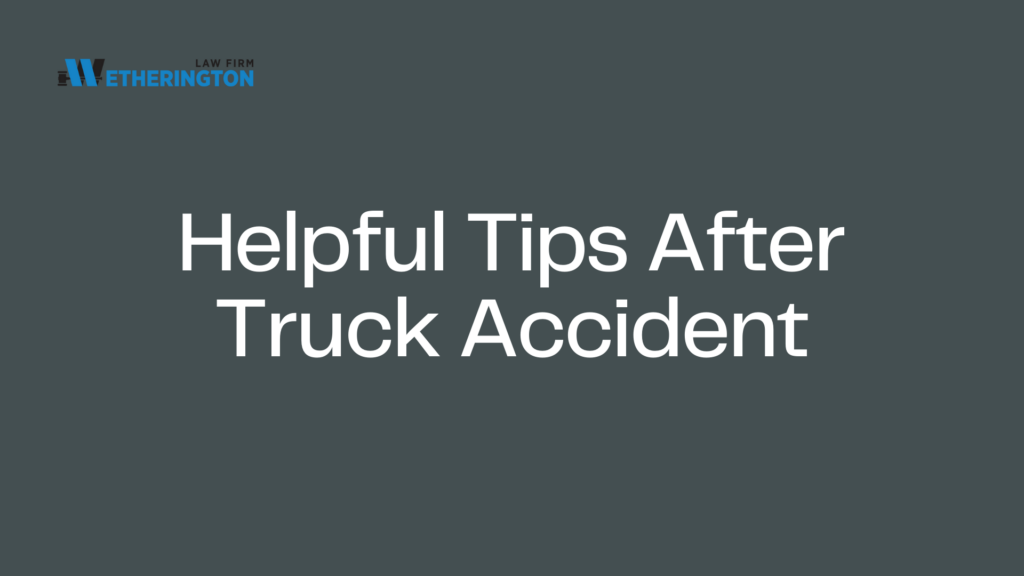What to Do if a Truck Accident Involves a Flatbed Truck
Posted by Wetherington Law Firm | Articles, Truck Accidents
- Articles
- Artificial Intelligence
- Car Accidents
- Class Action Lawsuit
- Comparative Negligence
- Crime Victim
- Defective Vehicles
- Disability
- Kratom Death and Injury
- Legal Marketing
- Motor Vehicle Accidents
- News/Media
- Other
- Pedestrian Accidents
- Personal Injury
- Results
- Sexual Assault
- Truck Accidents
- Uber
- Wrongful Death
Categories

- Ensure Safety: Move to a secure spot, call 911, and get medical care.
- Document the Scene: Take photos of damages, road conditions, and any cargo spills.
- Exchange Info: Share details with the driver; collect witness contacts.
- File Police Report: Give an account to the police; request a copy for claims.
- Notify Insurance: Report the accident factually; provide documentation.
Accidents with flatbed trucks present unique dangers due to the open and exposed cargo, which can shift or spill in an accident. If the cargo isn’t secured correctly, it may create further hazards on the road, affecting your safety and the severity of any injuries. Knowing how to handle the situation can help you recover physically, manage medical bills, and navigate the legal process to seek compensation.
Flatbed truck accidents can be complex, involving multiple parties and unique liability concerns. Following these steps will help ensure you gather all necessary information, protect your rights, and increase your chances of a fair settlement.
Step 1: Ensure Safety and Seek Medical Attention
After a flatbed truck accident, prioritize safety. Move to a secure spot, away from the road and any spilled cargo. Call 911, mentioning that the accident involves a flatbed truck and any possible hazards from unsecured cargo. Paramedics can treat common accident injuries such as fractures, cuts, or whiplash, and provide immediate care to those involved. Always get a medical checkup, even if your injuries seem minor at first. Medical documentation helps with handling medical bills and establishes a link between the accident and your injuries, which can be crucial in filing a compensation claim.
Step 2: Document the Accident Scene Carefully
Documenting the scene can play a vital role in supporting your case later. Use your phone to capture detailed images or videos of the accident area, including damage to vehicles, road conditions, visible cargo spills, skid marks, or road signs. Evidence of unsecured cargo or poor loading practices can help in proving driver negligence, strengthening your claim if the accident was due to the truck driver’s failure to secure their load properly.
Step 3: Exchange Information and Gather Witness Statements
Exchange information with the flatbed truck driver, including their name, insurance details, and the name of their trucking company. If there were witnesses, collect their contact information and ask if they noticed anything about the cargo or driver’s behavior, such as failing to secure the load or speeding. Witnesses can provide unbiased insights that are valuable when proving driver negligence. Their accounts add depth to your claim and give an objective perspective that could be useful in settlement negotiations or court.
Step 4: File a Detailed Police Report
Provide the police with a clear and accurate account of the accident, noting any details about the flatbed truck or its cargo. Request a copy of the police report, as it’s essential for getting a police report to support insurance claims or legal proceedings. This report often contains witness statements, fault assessment, and other details critical for insurance companies and attorneys when assessing fault and compensation. Police reports serve as an official document that strengthens your case and simplifies the claims process.
Step 5: Notify Your Insurance Company
After the accident, promptly inform your insurance provider, sharing only factual details. Provide them with the documentation you’ve gathered, including photos, witness information, and medical records, but avoid making assumptions about fault. Due to the complexity of commercial truck accidents, involving both the truck driver and possibly the company that owns the truck, understanding the accident timeline and staying organized is crucial. Submitting accurate documentation can expedite the process and ensure your insurance claim progresses smoothly.
How Can a Lawyer Help After a Truck Accident?
Engaging an Atlanta personal injury lawyer is a smart move when dealing with complex cases, especially with flatbed trucks that carry large and sometimes hazardous loads. Here’s how a lawyer can assist you:
- Evidence Collection and Analysis: An attorney can gather evidence like truck maintenance records, cargo logs, and company policies to uncover potential violations.
- Navigating Insurance Negotiations: Lawyers can negotiate on your behalf with insurance adjusters, who may downplay liability or the compensation you’re owed.
- Establishing Fault and Liability: Truck accident lawyers use industry terms and legal standards to assess if improper loading or poor vehicle maintenance contributed to the accident.
- Compensation Strategy: Your lawyer will work to secure fair compensation for your medical bills, emotional distress, and lost wages due to the accident.
Talk to a Truck Accident Attorney Today
If you’re considering a legal claim, consulting a lawyer who specializes in truck accidents can offer guidance on your next steps. An Atlanta truck accident lawyer will help evaluate your claim, explain the potential compensation you could seek, and outline the legal options available. Having professional assistance can make navigating the complexities of liability and compensation more manageable.
Contact us for a free consultation or call (404) 888-4444. You won’t have to pay unless we win your case!
Conclusion
Dealing with a flatbed truck accident can feel overwhelming, but following these steps can help you protect your rights and pursue fair compensation. Prioritize your health, document the scene, and gather all necessary details to support your case. By seeking the right legal guidance, you can work toward recovery and secure the financial support you need after a serious accident.
All our cases are handled on a contingency basis so you do not have to pay us until we win. Contact us today for a free case evaluation.